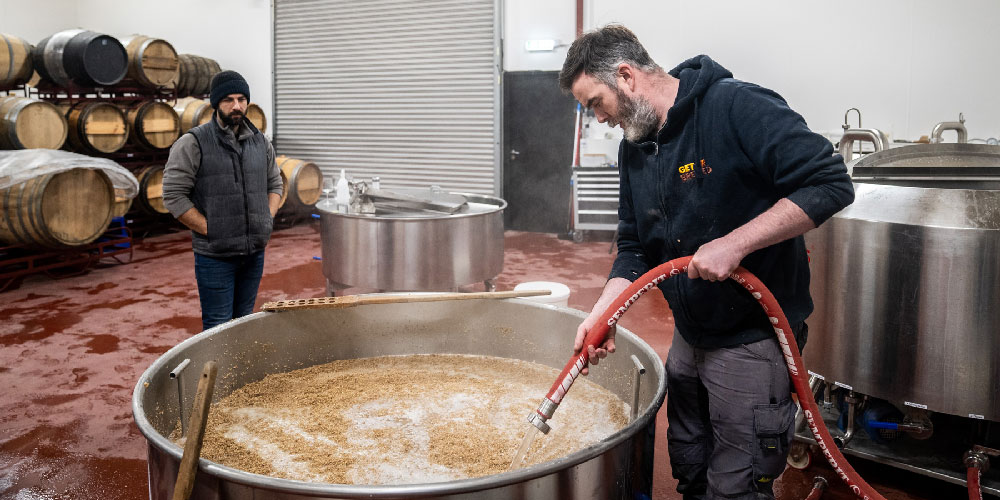
Contract brewing and packaging is an increasingly popular option for craft breweries looking to increase their production and distribution. A contract brewery, also known as a partner brewery, is a brewery that agrees to produce beer for a business that does not have brewing facilities. Similarly, contract packaging involves working with a third-party supplier to package. While this approach has its advantages, there are some potential drawbacks to consider. This blog post will explore the pros and cons of contract brewing and packaging beer.
What is contract brewing & packaging?
Contract brewing is a type of beer production in which a brewery outsources the production of its beer to another brewery. This option is particularly popular among craft breweries that don’t have the capacity to produce their beer. Contract brewing can also be used by larger companies looking to expand their reach and increase production capacity.
Contract brewing can be a cost-effective way to produce beer. It eliminates the need for a brewery to purchase and maintain equipment. It also allows for access to established expertise and capabilities from established breweries. Small-batch contract brewing is an especially popular option for those looking to experiment with new recipes or enter a new market without the overhead associated with setting up a full-scale brewery.
To use contract brewing, breweries must have the necessary licences. You may also need to pay fees for the contract brewing services. The cost of contract brewing can vary based on the scale of production and other factors. However, it generally remains significantly lower than starting up an entire brewery.
The Pros
Contract brewing can be an attractive option for brewers looking to increase capacity, expand their geographic reach, and grow their brand. It can also provide brewers with the benefit of professional packaging. Contract-only brands can be successful in the market and allow for easy geographic expansion and even potential brewery acquisition.
Contract brewing also allows people to enter the brewing industry with a low-risk investment. It involves a much smaller capital expenditure than setting up and running a production brewery. Contract brewing from a professional also gives brewers the confidence that their product is consistently well-made. It is beneficial for start-ups with limited budgets. The operating costs of small-batch contract brewing are so low they can give start-ups a chance at success in the competitive beer market. Moreover, contract brewing can be used to operate local distribution or a taproom with no onsite brewing. However, this requires a close working relationship with a Brewery and an AWRS Licence. Opening up access and introductions to distribution channels gives the contract brewer an added advantage. The working relationship between the production brewer and the contracted brand needs good communication to ensure forecasts and production schedules are met. Exploring the efficiency of volume breaks will allow both parties to maximise margin and bring savings.
The Cons
Contract brewing has some potential drawbacks that should be considered before you pursue this option for your business. One of the primary downsides to contract brewing is that it can lead to less of a community presence for your brand. Since contract brewing involves partnering with an outside brewery, you may have less control over the brewing process and where the beer is made. Contract brewing can also be more expensive than traditional brewing. You may have to pay consultancy fees if you don’t have a recipe and other costs associated with contract brewing companies. In addition, contract brewing can lead to a lack of brand identity. Our advice would be to show transparency from the start and market it to create a positive spin. Finally, there is a risk of quality control when contract brewing. You must trust the contract brewing company to provide consistent and high-quality beer. This is often easily avoided by adding lab tests to the agreement to protect both parties. Ultimately, it’s essential to weigh all of these factors carefully before deciding whether or not to pursue a contract brewing option for your business.

Should you contract brew your beer?
Contract brewing is when a brewery agrees to brew and package beer using a recipe that has been supplied to them or a brief of the recipe with consultancy and, research & development built in. The beer can be delivered to the brewery for packaging only. This allows you to focus on sales and marketing your brand while outsourcing the production. Contract brewing provides an easy, low-risk entry into the local beer industry. It can save you money in the long term, as the experience of a knowledgeable contract brewer could be invaluable.
Small-batch contract brewing may be a more cost-effective option when considering contract brewing. Contract brewing companies require an AWRS Licence or approved distributor to comply with HMRC directives. Ultimately, understanding contract brewing and its requirements is essential before deciding.
What is the cost of contract brewing & packaging?
The startup costs for a craft brewery with an automatic packaging line can exceed £250,000. This can be a significant barrier for startups just getting into the business and may not have the financial resources to make such an investment. Thankfully, it is possible to launch a beer brand with contract brewing services for a fraction of this cost. Around £5,000 or less.
More established breweries can also turn to contract brewing to save money. For example, rather than investing in equipment, they can work with a contract brewer to produce small-batch beers more quickly and cost-effectively.
Contract brewing services offer numerous potential benefits, including saving time, money and stress. Contract brewing can be especially helpful when starting, as it requires little upfront capital expenditure and can be used to expand your production capabilities quickly. Additionally, the licence required for contract brewing is typically easier to obtain than that needed for a traditional brewery.
Despite its advantages, there are a few drawbacks to contract brewing. In particular, brewers lose some control over their beer production and have less flexibility in terms of experimentation. Furthermore, depending on the contract brewing company, it may be more challenging to customize the flavour profile of your beer or control certain aspects of the production process.
Ultimately, the cost of contract brewing depends on the type and size of your operation. As well as the contract brewing company you choose to work with. Whether you are a startup looking to launch a new beer brand or an established brewery seeking to expand your product portfolio, understanding the costs associated with contract brewing is essential in ensuring your business remains profitable and successful.
Who is contract brewing and packaging for?
- Companies that would like to increase their portfolio of products.
- Individuals who want to build a brand before buying equipment.
- Breweries need to increase their production. This could be temporary before buying more equipment or for large orders.
- Establishments that would like a bespoke beer (i.e. Pubs, Bars, Hotels, Restaurants, Attraction Sites).
- Brewpubs that would like to offer more variety.
- Food or Beverage manufacturers that would like to offer their products in cans.
Who offers contract brewing in the UK & Ireland?
Contact Geterbrewed for further information. Depending on the scale of production you require, they can assist with introductions to their contacts or if suitable, it could be produced in the Our brewery facility at Geterbrewed. Our Brewery has an ultra-premium Brewiks Microbrewery Brewhouse complete with various sizes of Fermentation Tanks. The facility has a fully automatic canning line capable of packaging up to 2500 cans per hour and a kegging option in both Steel and One Way Kegs.